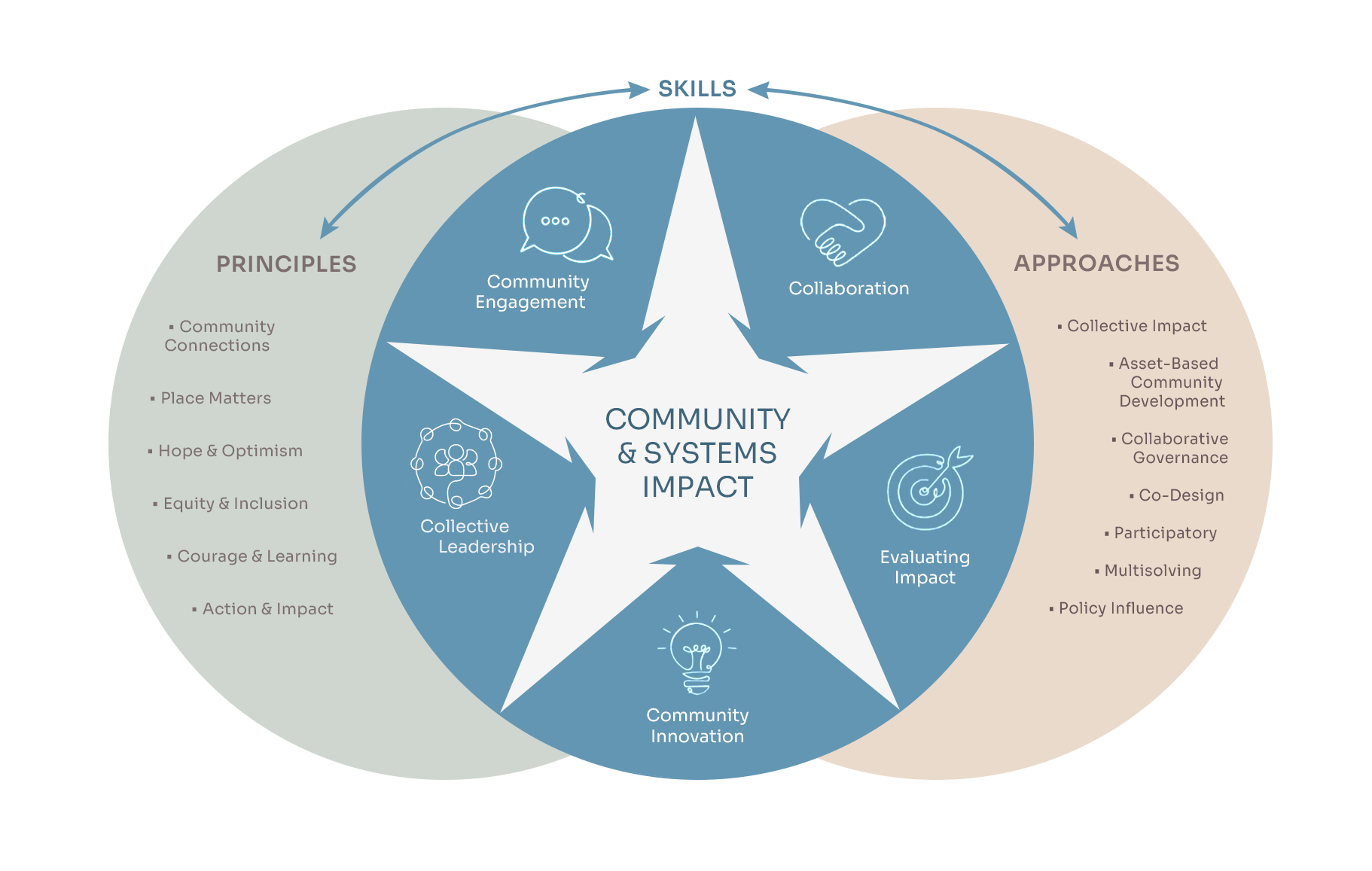
The
CHANGEMAKER
SELF-ASSESSMENT
Tamarack nurtures the capacity of changemakers to achieve greater impact.
Our framework for Community and Systems Impact was developed based on 25 years of experience leading community change and advancing practice to support municipalities, funders, non-profits, and community leaders to make progress on their most pressing community challenges.
The Changemaker Self-Assessment builds awareness of the skills needed to make community and systems change and invites people to deepen their skills.
This tool focuses on the five skills and seven principles, and connects you with relevant resources and trainings in a nurturing, inviting way. Learn more about the skills, principles, and approaches below:
Skills
The foundational skills, knowledge and abilities that changemakers require to advance community and systems change.
Community Engagement – How we bring community members together, particularly those closest to the issue, to learn and work together to co-create desired futures.
Collaboration – How we mobilize non-profits, for-profits, the public sector, and residents to work together and create a shared, whole community response for community and systems change.
Collective Leadership – How we organize and share responsibility to lead the community and systems change efforts.
Community Innovation – How we harness the unique characteristics of a community – the place and people within it – to generate, test, and scale new approaches for transformational change.
Evaluating Impact – How we assess our impact, learn together, and apply our collective insights to strengthen our effectiveness for community and systems change.
Principles
Principles are the core beliefs that guide our work. They provide the foundation—or lens—for how we approach all work towards community and systems change.
Connection & Belonging – Changemakers strengthen connections and collaborations between diverse people, organizations, and sectors to build trust, alignment, and accountability to achieve more together than we ever could apart. Changemakers recognize that belonging is fundamental to cultivating social cohesion, well-being, and transformative change.
Place – Changemakers focus our efforts on places where people live and leverage the unique stories, relationships and priorities of each place to achieve collective goals.
Strength and Optimism – Changemakers focus on the possible and our collective potential for achieving equitable outcomes. Changemakers believe that change is possible through individual gifts, strengths and imagination to describe our collective agency to affect positive change.
Equity and Justice – Changemakers centre lived experience and amplify work in service of equitable outcomes. They are transparent and open about our journey and learnings and work to close equity gaps.
Courage and Learning – Changemakers ask difficult questions about the systems and structures that are holding problems in place. Changemakers engage in peer-to-peer learning to build our capacity, lean into our curiosity, overcome challenges, and change our beliefs and practices.
Action and Impact – Changemakers focus on the ‘how’ and galvanize a community to act. They build awareness, momentum, and track progress towards impacts for individuals, communities, and systems that can be sustained for future generations.
Approaches
Approaches are the ways that we use our skills to convene people to think, learn and drive change together. They are the methods we employ, the actions we take, and the tools we use that align with our principles. Below are some of the key methods that Tamarack believes are important for community and systems change:
Collective Impact – A structured approach to collaboration that brings together diverse groups and sectors to address complex social issues and achieve community and systems impact.
Asset-Based Community Development – Asset Based Community Development or ABCD is an approach that looks for and starts from people’s gifts and strengths (assets). These assets equip people to create local opportunities and respond to needs and challenges in their neighbourhoods.
Multisolving – Finding and implementing solutions for more than one social, economic, and/or environmental issue at the same time, creating positive impacts across various areas.
Collaborative Governance – The structures that support collaboratives to achieve their common goals, make decisions, and implement shared work in a collective and inclusive way.
Participatory Approaches – Processes that place faith in the ability and willingness for individuals and communities to work together to define outcomes, contribute resources, lead, and make decisions in initiatives that affect them. It enhances self-reliance and self-determination. Participatory approaches include participatory decision-making, participatory evaluation
Co-Design – A process for bringing diverse members of the community together, particularly context experts, to develop new ideas, create innovative solutions to persistent problems, and build alignment and momentum for action.
Policy Influence – Sharing emerging practice amongst community change-makers, informing policies, and amplifying.
Tamarack Institute is currently inviting changemakers to take the Self-Assessment as part of a select beta test. This means that you're one of the first learners to try it. There may be some blemishes, glitches, or other elements still improving. We appreciate any feedback you can provide to help us make the self-assessment as impactful as possible.
We invite you to register below - you'll receive instant access to the current version of the self-assessment tool.
